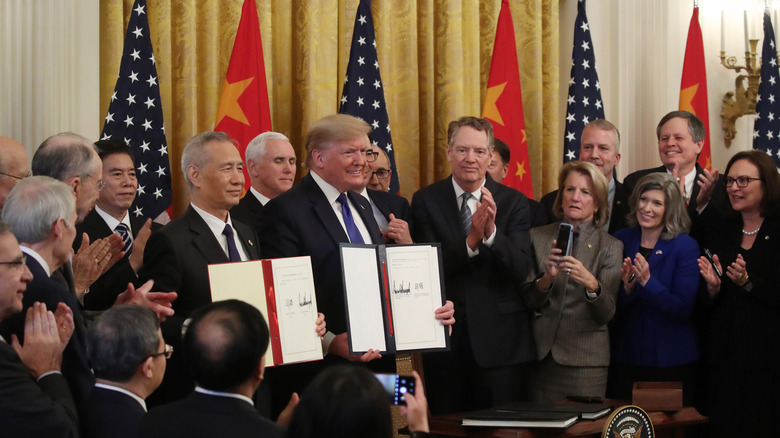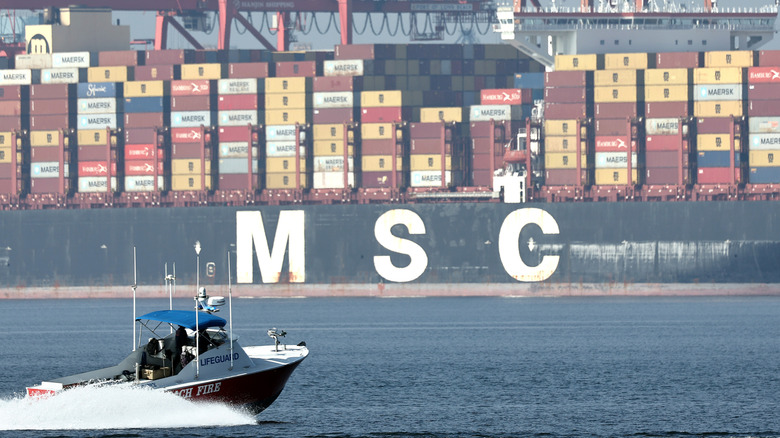Donald Trump's Tariffs Could Have A Substantial Impact On Small Businesses
Donald Trump is officially set to take the oval office in January of 2025 to embark on his second presidential term. With the President-elect's return to power, he has made quite a few substantial promises for how he will run the country this time around. These include new policies such as mass deportations of immigrants, potentially creating a strategic bitcoin reserve for the United States, and imposing strict tariffs on imports from foreign countries.
While it's no secret that the policies of Trump will bring massive changes to the United States businesses have grown accustomed to under the Biden administration, some will undoubtedly have a greater impact than others. One of the most notable of these are Trump's proposed tariffs on imports from countries like China, Mexico, and Canada. Here's an inside look at what tariffs are and how they will impact small U.S. businesses in the years to come.
What are tariffs?
Tariffs are a form of tax issued by governments upon imports from foreign countries. They are used as a method of revenue generation for the governments that impose them and are paid for by the country the products or services originate from. One of the more prominent goals of imposing these tariffs is to increase domestic production and support businesses within the country they are issued by. This is because when governments raise tariffs on foreign imports, the exporting countries are forced to increase prices of said products. This encourages consumers to buy domestically manufactured goods over foreign ones as tariffs make the latter more expensive.
Think about it this way. Say you are looking to buy a new television and you take a trip to an electronics retailer like Best Buy to do so. When you get to the store, you have two options of televisions to buy. They are both the same quality, but the one that's made in America is several hundred dollars cheaper than the one made in China. For that sole reason, you are obviously going to be more inclined to buy the American made television set. This is the type of scenario that increasing tariffs on foreign imports is meant to encourage.
How will tariffs affect small businesses?
Now that we know what tariffs are, the purpose they serve, and how they are meant to impact the purchasing decisions of consumers, let's take a look at how American small businesses may fare from increased tariffs. The first factor in this equation is going to be the type of small business in question. For example, small businesses that manufacture their products within the United States are going to greatly benefit from increased tariffs on foreign imports. This is because there will likely be decreased competition with foreign competitors due to the simple fact that their products will become less expensive for consumers.
However, businesses that don't rely on domestically manufactured products but instead rely on imports will be hurt the most from increased tariffs. Unfortunately, this applies to the majority of small- and medium-sized businesses in America. According to a 2024 FedEx Trade Index Survey, more than 75% of these businesses in America rely on foreign imports for their business ventures. Businesses that import from Chinese manufacturers will likely be the most hurt of this group as Donald Trump has proposed as high as a whopping 60% tariff on Chinese products.
Adjusting to increased tariffs
One thing is for sure, with an incoming Trump administration in 2025, increased tariffs on foreign imports are highly likely. We can be fairly certain about this seeing as it has been one of the most outspoken promises of his campaign and a policy stance he took in his first term as president as well. This being the case, the majority of U.S. small business owners that rely on foreign imports are going to have to prepare for the inevitable.
As of what we know right now, Donald Trump has proposed a 25% tariff on Mexican and Canadian imports and a 60% tariff on Chinese imports. Knowing this, small businesses that rely on imports from these countries might want to start looking elsewhere to obtain similar products, potentially from domestic manufacturers if financially possible. Outside of this, it is important to stay updated with any incoming policy news regarding tariffs from the incoming Trump administration. This will help small U.S. businesses prepare for what's to come.



